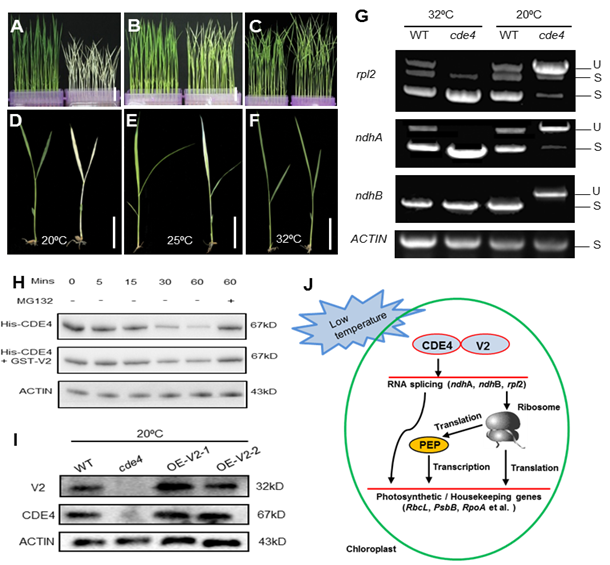






CDE4 encodes a pentatricopeptide repeat protein involved in chloroplast RNA splicing and affects chloroplast development under low-temperature conditions in rice
August 19th, 2021
The chloroplast is an organelle that conducts photosynthesis to provide the necessary energy and materials for plant growth and development. As a semi-autonomous organelle containing limited genetic information, the formation and function of chloroplasts requires the synergic action of the plastid and nuclear genomes. Pentatricopetide repeat (PPR) proteins encoded in the nuclear genome were found to function in RNA splicing in chloroplasts and mitochondria. As one of the largest plant protein families, the PPR family contains 477 proteins in rice (Oryza sativa L.). The functions of its members, however, remain unclear.
Recently, the rice quality improvement research group from China National Rice Research Institute (CNRRI) studied a P-type PPR protein CDE4 and found it plays a vital role in the regulation of rice chloroplast development, especially in low temperature. The work further revaled the underlying molecular mechanism of rice chloroplast development at low-temperature conditions, making the functions of the PPR family and its role in chloroplast development are better understood.
In this study, the researchers isolated chlorophyll deficient 4 (cde4), a rice mutant that shows an albino phenotype under low-temperature conditions. The researchers reported that while the intron splicing and the leaf color were found normal at a high temperature of 32 degrees Celsius, the intron splicing of chloroplast genes rpl2, ndhA, and ndhB in the cde4 mutant was abnormal under a low temperature of 20 degrees Celsius, leading to abnormal chloroplast development and an albino phenotype.
Then they conducted positional cloning, splicing analysis and subcellular localization, which showed that CDE4 encodes a P-type PPR protein localized in chloroplasts. It was also found that that CDE4 can interact with the guanylate kinase VIRESCENT 2 (V2), whose accumulation enhances CDE4 protein stability. The overexpression of V2 in the cde4 background helped restore the plastid RNA splicing at low temperature, resulting in normal chloroplast development and alleviated albino phenotype.
The study entitled “CDE4 encodes a pentatricopeptide repeat protein involved in chloroplast RNA splicing and affects chloroplast development under low-temperature conditions in rice” was recently published in Journal of Integrative Plant Biology. Ph.D. candidate LIU Xinyong and ZHANG Xichun graduated with a master's degree from CNRRI are the co-first authors of this paper. Prof. HU Peisong and Prof. WEI Xiangjin from CNRRI are the co-corresponding authors.
This work was supported by the Natural Science Foundation of Zhejiang province (LR20C13002), the special support plan for high level talents in Zhejiang Province (2019R52032), and Agricultural Sciences and Technologies Innovation Program of the Chinese Academy of Agricultural Sciences.
Paper link: https://doi.org/10.1111/jipb.13147

· Study Reveals How the Clock Component OsLUX Regulates Rice Heading
· Scientists Further Unravelled the Underlying Mechanism of Heading Date Control in Rice
· Improving the efficiency of prime editing in rice
· A New Infection Mechanism of Ustilaginoidea virens is Revealed
· Scientists Further Reveal the Infection Mechanism of Ustilaginoidea virens
CNRRI Today
Copyright © 2014- China National Rice Research Institute